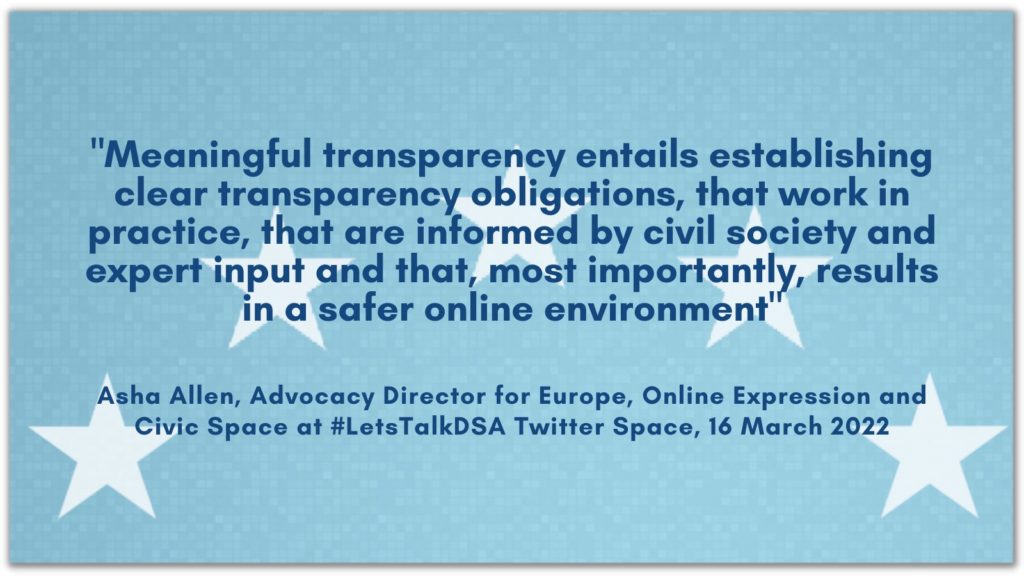AI Policy & Governance, European Policy, Free Expression, Privacy & Data
EU Tech Policy Brief: March 2022 Recap
This is the March 2022 recap issue of the Centre for Democracy & Technology Europe‘s monthly Tech Policy Brief. It highlights some of the most pressing technology and internet policy issues under debate in Europe, the U.S., and internationally, and gives CDT’s perspective on them. Our aim is to help shape policies that advance our rights in a digital world. Please do not hesitate to contact our team in Brussels: Iverna McGowan, Asha Allen, and Ophélie Stockhem.
CDT Holds Roundtable on EU Digital Services Act, Fundamental Rights, and Civic Space
On 14 March, CDT Europe held a roundtable on the EU Digital Services Act, fundamental rights, and civic space. The event was co-organised with Open Governance Network for Europe, a joint initiative of the Open Government Partnership and Democratic Society.
The event featured French Secretary of State for Digital Transition and Electronic Communications Minister Cédric O, his advisor Charles-Pierre Astolfi, and representatives from member states and several civil society organisations. Minister O and civil society experts first discussed the state of play of fundamental rights in the DSA, and national and European officials and civil society participants then talked about specific thematic areas within the DSA. These included what gaps in fundamental rights protections and due diligence obligations exist throughout the draft regulation, how to ensure an effective enforcement regime and accountability from all stakeholders, and how to improve civil society participation in the development and implementation of the DSA. They also covered the legislation’s implications for fundamental rights and civic space in and beyond the EU.
By organising such events, CDT Europe, alongside our civil society partners, aims to establish a standing space for civil society exchange with the European Council, and foster a deeper understanding of the fundamental rights and governance issues at play in the digital era among the EU and its member states.
CDT Europe Joins Twitter Space on the DSA, Algorithms, and Transparency
On 16 March, Asha Allen, CDT Advocacy Director for Europe, Online Expression & Civic Space, joined the Twitter space #LetsTalkDSA to discuss algorithmic transparency and the Digital Services Act. Speaking about how algorithms work and why meaningful transparency matters, Allen stressed that transparency is one of the mechanisms of platform accountability, and a vehicle to improve users’ understanding of and choice between the services and systems they interact with.
Allen highlighted the challenges of ascertaining all the potential fundamental rights harms raised by the use of algorithmic systems in automated content moderation tools, as an example, and insisted that the Digital Services Act is the opportunity to establish clear and enforceable transparency obligations, informed by civil society and expert input, that should result in a safer and more transparent online environment.

CDT Europe Calls on EC to Protect Digital Rights in Draft Regulation on CSAM
CDT Europe has signed a joint letter, initiated by EDRi, to call on the European Commission to protect digital rights and freedoms in the context of its upcoming regulation tackling the online dissemination of child sexual abuse and exploitation material (CSAM).
The letter reacts to a leaked document, published in mid-March by Contexte, containing the opinion of the European Commission Regulatory Scrutiny Board on the draft legislation. The document indicates that the draft Regulation will include a mandate for online communications providers to generally monitor private communications, including when such communications are end-to-end encrypted, in breach of the prohibition to mandate general monitoring — a central tenet of a rights-protecting internet ecosystem.
The letter warns the Commission that, if enacted as drafted, the CSAM legislation would result in unintended consequences for the right to privacy and confidentiality, including those of children and survivors of abuse, and would compel service providers to intrude on people’s private communications without justifiable suspicion. In order to counter these trends, the statement also lays down fundamental rights principles that the forthcoming legislation should guarantee.
CDT Europe Addresses Euractiv Digital & Media Debate on the Digital Services Act
On 22 March, Asha Allen joined a panel discussion organised by Euractiv and focused on what the EU’s digital economy will look like after the Digital Services Act. The aim of the event was to take stock of the interinstitutional negotiations on the DSA, and ask what will definitively change for users in Europe and beyond after the Regulation is adopted.
Allen emphasised that the legislation will provide additional clarity on the processes and mechanisms for content moderation, specifically for users. She stressed the importance of balancing all individual and collective rights included in the European Charter of Fundamental Rights, instead of preserving some rights over the others. Allen reiterated the important role of the EU in setting a global precedent for the most comprehensive and holistic legislative framework for platform and content governance.

Digital Services Act Snapshot
Since the last political trilogue on 22 March, significant developments have occurred in the DSA negotiations, and civil society aims to keep pace with the institutions’ fast-moving priorities.
On 25 March, EU institutions reached a preliminary agreement on the Digital Markets Act. In a welcome step for fundamental rights and civil society, French Secretary of State for the Digital Transition Cédric O officially announced that a ban on the use of sensitive personal data in targeted advertising, and additional ban on targeted advertising to minors, would be agreed in the Digital Services Act negotiations. As of 30 March, however, this commitment seems to have been downsized. The proposal from the European Council includes the ban on targeted advertising towards minors, but when it comes to the use of sensitive data, refers to the existing GDPR standards.
The negotiations also covered two new proposals from the Commission. The first focused on a new crisis management mechanism, which — in seeming reaction to the ongoing Ukrainian crisis — outlines additional obligations for platforms to address systemic risks, namely the spread of disinformation in exceptional circumstances. The Commission also introduced the idea of a supervisory fee paid by very large online platforms and online search engines, which would partially fund the Commission’s efforts to enforce and monitor compliance with the DSA, as well as the idea of random checks by online marketplaces for illegal products.
Ahead of the latest trilogue, which took place on 31 March, the French Presidency prepared a new list of items to negotiate in the first three chapters of the DSA proposal. Despite some concerns about last-minute changes to this negotiating mandate, representatives from member states in the Committee of Permanent Representatives in the European Union (COREPER 1) agreed to move forward. The mandate remains broadly in line with the Council’s general approach and the compromises already circulated in March, but moves away from the text by easing some obligations for marketplaces.
At this latest trilogue, negotiators focused on how to implement the regulation, including through possible supervisory fees for very large platforms. They also discussed online advertising, referral systems, and the exemption of small and medium-sized enterprises from certain due diligence monitoring obligations. Technical discussions on voluntary content moderation measures and communications security and anonymity were also on the agenda.
According to recent sources, the next political meeting is expected on 22 April, or on 27 and 28 April.
Don’t forget to check out CDT Europe’s publications for this month!


